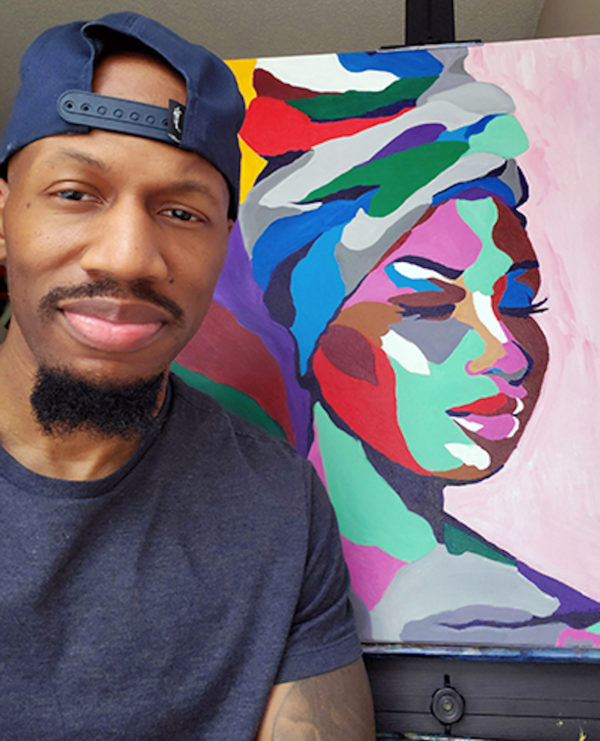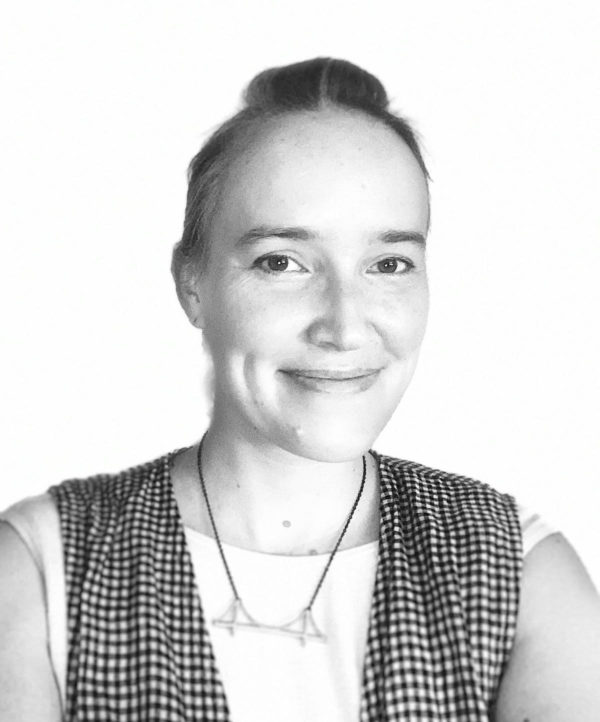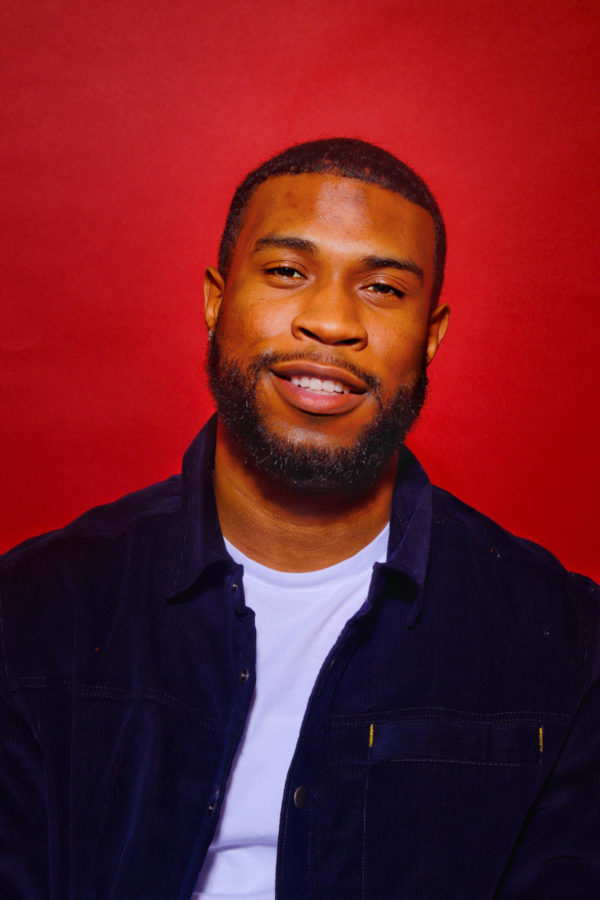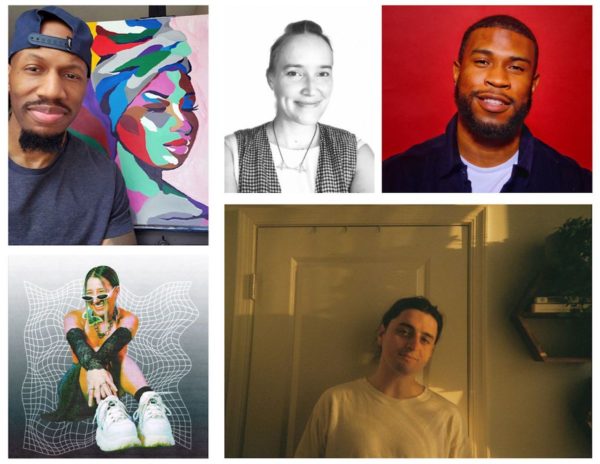Until recently, Holden Blanco dreamed of making six figures.
Coming out of the pandemic, where he lost most of his client work as a freelance photographer, his main priority was economic stability. He’d graduated from Haverford College in 2017, and took a string of jobs — anything he could find — while he grew his photography business. He was in a good place at the start of 2020 when a recession and social distancing wiped much of his work.
“You’re not guaranteed your next meal … you can lose something at any time, like in 2020,” he told Technical.ly. “I’m not someone who comes from privilege. I can’t just rely on my parents like some people can. So I have to make every decision carefully. Every piece of equipment I purchase has to be very intentional.”
But last year, Blanco, 27, of Queen Village, hit his goal. He was working full-time at a marketing startup, a job he took in early 2021 to gain some stability and recoup some photography clients. There wasn’t a lot of extra time in the day, and it wasn’t work he was passionate about — “I don’t know how people find joy in marketing,” he quipped.
Introducing Thriving
Blanco’s relationship with his creative pursuits is one of five stories we heard for the first installment of Technical.ly’s new storytelling project, Thriving. The project, which will be produced via reported articles, an audio series and community engagement efforts over the next year, will show a peek into the lives of everyday Philadelphians, including the obstacles and opportunities they face in reaching their economic and personal goals.
Over this year, we’ll talk to Philadelphians in a variety of groups and circumstances. We want to know about their goals, what drives them, their relationships to work, and how they define success.
In the first part of this reporting series, we spoke with gig-working creatives in Philadelphia — folks who are freelance, or are self-employed, and make their income via creative pursuits.
Gig work is growing, especially in the pandemic, and it was estimated last year that gig workers represent as much as 35% of the US workforce. A Technical.ly analysis of five-year census data shows nearly 46,000 gig workers in Philadelphia for 2016-2020; around 6,300 of those earn the majority of their income in the creative fields, such as music or art.
We asked five of these Philadelphians what it meant to thrive in the year 2022, and while economics plays a large part, sense of control, the ability to work when they want and mental health were also recurring themes.
###
Misha Cariola — ‘Above just giving yourself life’
Misha Cariola, a 27-year-old illustrator and graphic designer in Queen Village who also goes by the name Blanco Rabbit, said she knew early on that she wasn’t cut out for her design-focused desk job at University of Pennsylvania. She had originally pursued a degree in business at Drexel University, but knew that, too, wasn’t it.
In a graphic design class at Bucks County Community College, she found a fit — a way to blend artistry and design skills. She then earned a degree from Temple University’s Tyler School of Art, and after a while working at Penn, Cariola made a leap to work for herself right before the pandemic. It ultimately led to months without contracts, but she doesn’t regret it, she said.
“I really picked the perfect time to try to freelance. But I’m actually really happy I made that decision before COVID,” she said. “If COVID happened, I would have been working from home for Penn. I don’t think I would have had the willpower to leave.”
In the years since, Cariola’s work has snowballed, picking up clients by word of mouth and networking. She’s also recently started DJing, picking up income and illustrator clients in the new music scene network she’s joined.
She, too, had financial goals for herself that she recently achieved — sustaining her life and expenses through creative work. But she’s amended them, considering more comforts, freedoms and necessities (like health insurance) as the next step. There are workarounds, like paying for care out of pocket, but it’s not the best way to live, she said.
“When I think ‘thriving,’ I think, not only are you living, but you’re living above just giving yourself life,” Cariola said. “I would consider thriving having health insurance, traveling, taking sick days when you need to.”

Misha Cariola, who goes by Blanco Rabbit. (Courtesy photo)
Right now, she feels as though all of life’s responsibilities and challenges fall on her, like putting money aside for taxes and factoring PTO into the cost of business. Companies are keen to hire contractors to not have to pay for all the benefits full-time employees get, she said.
“It does feel like everything’s falling on me from both sides, and it doesn’t feel like there’s a lot of help or anything that benefits contractors,” Cariola said. “It’s kind of like, ‘You don’t want to work a 9-to-5 job?’ then you’re screwed. It feels like society is set up to be attached to your job. Mentally and emotionally, I feel very fulfilled, and right now I think that’s more important to my mental health than paying for health insurance.”
Cariola pictures a future where she has steady graphic design work with a handful of big clients and can say yes to the DJ gigs that make her happy. She’s a go-with-the-flow person with bursts of energy that she uses to knock our work in spurts, and spends the next day playing video games. Working for herself means she gets to listen to her body more, and unlearn some of the habits formed at old jobs.
“Being able to fill my cup with more things that make me happy would be my biggest goal and like, what I would consider thriving,” Cariola said. “I don’t need to be making a ton of money, I just simply want to enjoy my life and do what I love.”
David Coleman — ‘It basically found me’

David Coleman. (Courtesy photo)
David Coleman, a visual artist based out of Elkins Park, said he never intended to make a living off artistic endeavors. He grew up in Germantown and North Philadelphia, and art was a way to keep him occupied. His mother was an artist, and he had the natural talent for it, too.
“Since as far back as I can remember, it kept me out of trouble,” Coleman said, “especially as I got older. And it got me into places where I wouldn’t have been able to get into otherwise, positive places, like CAPA [Philadelphia High School for Creative and Performing Arts] where you have to audition. If it wasn’t for art, I would have probably gone to one of my neighborhood schools, and I don’t know how my life would have been different. It basically found me.”
Since he graduated from CAPA in 2003, Coleman tried his hand at a musical career, working in hip-hop music production and songwriting. He also worked a lot of “normal” jobs — hourly gigs in retail, or similar industries. But he kept drawing and making visual art. It wasn’t until he began posting his sketches on Instagram in 2015 or so that he even considered being able to make money from them.
As his follower count grew, opportunities opened.
Coleman said his relationship with art changed when it became income.
“I was good at art, so I was just doing it when I felt like it. Which is different from when you start making money doing it seriously — there’s a certain level of self discipline that comes with that,” he said. “My mindset about art is totally different when it’s tied to discipline. I have to draw when I don’t feel like it, I have to paint when I don’t feel like it, I have to design when I don’t feel like it because it’s my job.”
It’s part of gaining maturity, said the artist, now in his late 30s. He hadn’t taken school or work too seriously before this shift, and he watched other aspects of his life fall off and pass him by. He was known as someone who was good at a lot of things, but was lazy, he said. But when it came to his art, his gift, he changed his mindset.
Coleman now supports himself on a mix of streams of income including painting, sketching, gifs, digital illustrations, graphic design, logo making and book illustration. That initial aspiration of making money from art has been achieved, but his goals have changed.
“The more you achieve, the higher the goals are,” he said.
He’s worked to make art for large corporations, and has grown a social media following around the world. But while some months are lush with prospects, others aren’t as consistent. But he’s reached the status of being known for his art — which in part, he considers thriving.
Kara Lindstrom — The slow-life approach
The numbers were never a first priority for Kara Lindstrom when she started working for herself. The leadership consultant and creator of Leadership Tarot, a card deck that helps managers figure out their style and strengths, came from the creative side of higher ed and tech in roles with Drexel’s ExCITe Center and PromptWorks.
Her move from Drexel to the dev agency a few years ago was fueled by the desire to gain some more work-life balance, and the work was interesting and stimulating, Lindstrom said. But it ultimately led her to work for herself: “It became important to have a little more control of my life. I loved the work, but I have the tendency to go full-tilt into things, and it’s hard to say, ‘That’s enough.’”

Kara Lindstrom. (Courtesy photo)
Since 2020, Lindstrom has been growing her consulting business through word of mouth, and even picked up work during that year’s census count. If you’d asked her then if she was thriving, she’d have told you no. But the 40-year-old said she feels she’s in that place now — although like many self-employed people, if you ask her again in a few days, you could get a different answer.
Though financial growth is on her list of what success for her business looks like, freedom, long-term planning, and some “slow-life” approaches — she’s taken urgency out — to her work also top the list. When Lindstrom began work on the Leadership Tarot deck more than a year ago, she was investing her own money into the product. She took a classic MVP approach, connecting with communities online, finding an artist through Freelancing Females to produce the deck, and incorporating feedback into newer iterations.
“This is that intersection of like, the pragmatism of business and the creativity of the pure arts perspective,” she said.
In building her business over the last few years, Lindstrom has found success in thinking longer term. The cheap apartment she found in South Philly a decade ago makes a great home to now share with her partner, but also serves as a money-saving tool to devote more resources to her business, she said. She thanks her past self a lot for decisions like this, or for setting up an LLC years ago that she was able to register her current business with when she started it.
While budgeting and money management isn’t the top of her priorities, she does have a goal of paying herself more each year. The first year of her consulting business, she paid herself quarterly, then monthly, and now she’s increased those amounts. But her definition of success is oriented around her quality of life.
Lindstrom has been curious about how the pandemic has changed the perception of thriving for her and others. She thinks age, time and other factors likely affect that understanding.
“Five years ago, would I have said I was thriving? In 2017 I might be like, ‘Well, I’m approaching burnout, but parts of my social life have really improved,” Lindstrom said. “There would have been this different mix.”
Joshua Meekins — Setting boundaries and advising the next generation
Joshua Meekins, a 29-year-old who recently moved from Philly to the Cherry Hill area, has been growing his storyteller and producer career while he works full time. He’s behind “Oldhead: The Series,” chronicling in seasons the “authenticity” of Philadelphia’s urban culture through short episodes. He’s been growing a community of fellow creatives for the last few years as a member of the creative hub REC Philly.
“I didn’t really know anyone else in the city doing what we were doing,” Meekins said. Being a part of that community changed that.
Meekins said he’s a big believer in not having to quit your job to build a creative career, and he works full time with an organization that gets kids full rides to college. It took some work to be able to balance the two and to fight burnout, but he believes it ultimately comes down to passion, and knowing at a young age that he wanted to be a storyteller.
“Over time, I started developing boundaries,” Meekins said. “You form confidence in yourself. You say, ‘If I do this, I need to get paid some sort of amount.’ There’s boundaries you put up as you progress.”

Joshua Meekins. (Courtesy photo)
While others noted financial or business resources that would help them progress in their career right now, Meekins’ biggest challenge is time. If he could give the same time and effort to his creative pursuits as he can his 9-to-5, he’d be in a different position, he said. He’s close to being where he wants to be, and growing his network has helped.
Something he wishes he had known earlier on in his career was the business behind creativity. Creatives are passionate, he said, and their drive is in creating. But you have to be able to monetize your material. “Old Head” got 1 million views in a few months of its release, but the team didn’t have the financial chops to profit off of that, Meekins said. They weren’t as interested in the business aspect until they realized how much they were shelling out to make the art.
It’s insight he’s passed along to other creatives earlier in their ventures. Passing along his own hard-won wisdom is increasingly important to him.
“I wouldn’t say I’m thriving yet. I’m definitely headed in that direction. I feel like you’re only as good as the resources you can allow to people, that’s kind of like your worth or your wealth,” Meekins said. “We finally got to a place where we can now help other people establish themselves, help with job opportunities, we can offer information, insight, how we got to where we were. I feel like that’s thriving, where you can impact the generation of creatives below you.”
Holden Blanco — ‘It matters how I feel about myself’
Between the startup job and his photography business, Blanco hit his six figures earnings goal recently. But now that he’s there, his wants have changed. He recently resigned from his marketing job to pursue photography full-time, knowing he’d be taking a pay cut.
“I’m beginning to realize my priorities are not necessarily strictly financial,” Blanco said. “A big shift in my priorities has happened over this summer. Life is short, the world is ending, nothing matters. You really have to find joy in what you do every day.”
Blanco’s goals are now driven much more on feelings versus numbers. He wants to feel secure. He wants to someday buy a home with his partner. He wants the space to explore the Super 8 film format. He wants stability and creativity in his work. And he wants access to health insurance.

Holden Blanco. (Courtesy photo)
He credited building his business in Philadelphia for finding this balance, and having access to New York City while paying affordable rent and living expenses as making that possible. He’s fostered a community so much more easily, he said, and is a member of REC Philly, where he shares resources and makes connections.
“I am happy with myself, and I don’t think thriving has a number on it,” Blanco said. “I don’t think it matters how much I make. I think it matters how I feel about myself, about my life, about my future, about my work. I think so many people get caught up in planning for the future that they forget to enjoy the present.”

This report is part of Thriving, a yearlong storytelling initiative from Technical.ly focused on the lived experiences of Philadelphia and comparative city residents. The goal is to generate insights about the economic opportunities and obstacles along their journeys to financial security. Here's who we're focusing on and why.
Join our growing Slack community
Join 5,000 tech professionals and entrepreneurs in our community Slack today!
Donate to the Journalism Fund
Your support powers our independent journalism. Unlike most business-media outlets, we don’t have a paywall. Instead, we count on your personal and organizational contributions.

National AI safety group and CHIPS for America at risk with latest Trump administration firings

The good news hiding in Philly’s 2024 venture capital slowdown

How women can succeed in male-dominated trades like robotics, according to one worker who’s done it


